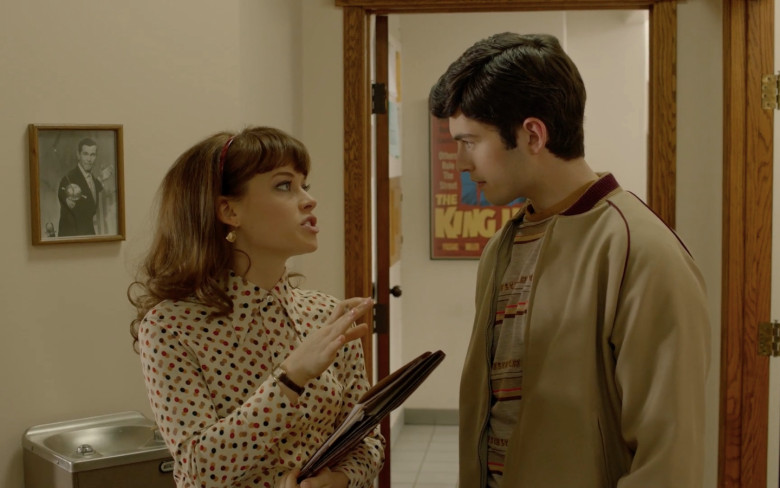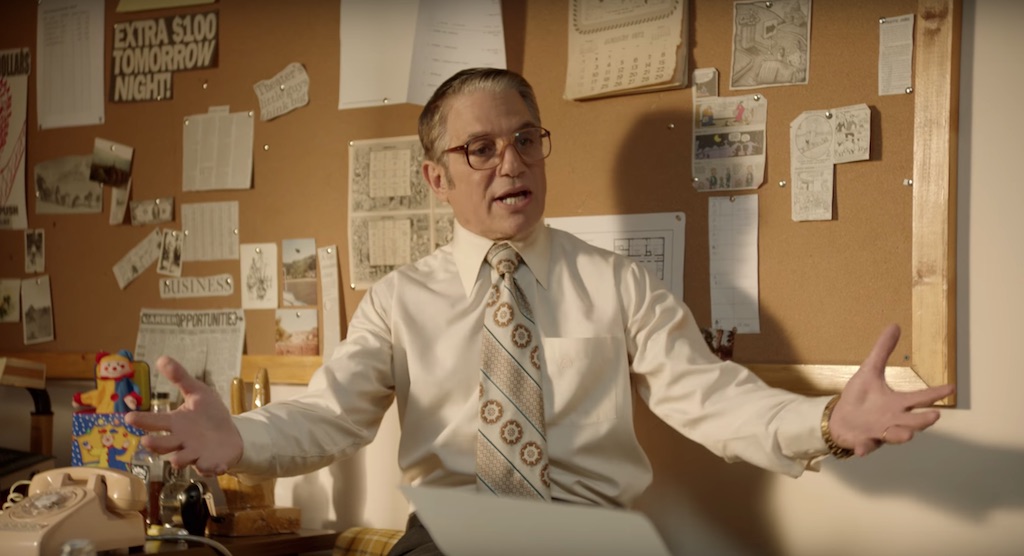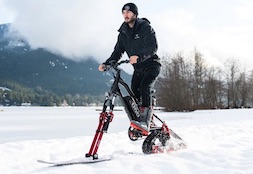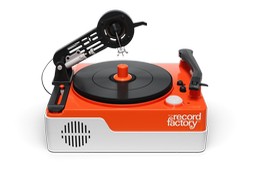When Paul Reiser calls, I recognize his voice immediately. A mellifluous baritone, with a New Yorker’s manic rhythms, it perpetually feels as if he’s on the cusp of telling a joke. He often is.
Naturally, ignorant millennials such as myself are most likely to recognize Reiser from his supporting roles in recent projects, like FX’s smart, short-lived series Married, where he played the older husband of Jenny Slate; Amazon’s Red Oaks, where he stars as the good-hearted, hard-ass country club president; and, last but not least, the morally ambiguous Dr. Owens from Stranger Things 2. Earlier in his career, though, Reiser of course starred in the long-running network sitcom, Mad About You, and perhaps the most iconic movie about young guys hanging out and shooting the shit of all-time, Barry Levinson’s Diner. Before that, he made his name as a stand-up comic.
Which, coincidentally, brings us back around to Reiser’s current project, and the reason he called in the first place: his new show, There’s...Johnny!, the first season of which drops on Hulu today. Created by Reiser and his producing partner, David Steven Simon, the show is a workplace comedy set at the The Tonight Show Starring Johnny Carson, circa 1972. We’re first introduced to 19-year-old Andy (Ian Nelson), a very green, wide-eyed Nebraskan who takes off for Los Angeles after mistaking Carson’s response to a fan letter as a job offer. From there, we meet the whip-smart, no-bullshit 24-year-old producer, Joy Greenfield (Jane Levy), the boy’s club of writers and the show’s real longtime producer Fred de Cordova, played with magnetic panache by the great Tony Danza. Chaos, romance and failed monologue jokes ensue.
As a teenage viewer and, later, a young comic who frequented The Tonight Show himself, Reiser has a unique fascination with and respect for Carson—which is partly how he convinced the Carson's estate to partner with the show, and grant him access to a trove of archival footage. Though Reiser and Simon decided not to cast anyone as Carson, the show is interspersed with real clips—of, say, George Carlin and Steve Martin—that serve as fuel for fictional behind-the-scenes plot lines.
I chatted with Reiser about his decision not to cast a Johnny Carson, Tony Danza and where Carson would land in the current late-night landscape. Then, I gave up the façade and badgered him with a few fanboy questions about his experience on Stranger Things 2.
So how did There’s...Johnny! come about? Why this show? Why now?
It was an idea a buddy and I had about 12 years ago, just riffing on stuff as we do. Somehow, we stumbled on this idea of doing a show at The Tonight Show during that period. There was something very magnetic and powerful about that time for us as viewers, as 15-year-olds watching The Tonight Show. And then we came up with this idea of having a wide-eyed kid serving as the audience surrogate—dropping him into this crazy world of sex, drugs, rock and roll and show business, in that moment of history in 1972.
It occurred to us early on that it would be great to have the coop and partnership of the Carson team. They liked the idea. But there was always some reason for them to not say yes. Every couple of years I’d give the guy a call and finally he said, “Yeah, let’s do it.” I think he knew that I had been on Johnny a lot, and that Johnny was very gracious, very helpful, very supportive of me. He knew the respect and affection I had for Johnny. He knew he could trust me. By having them on board, we had access to the footage, to all the clips, which gave the show this extra level of authenticity. Because we didn’t want to cast someone to play Johnny Carson. And the show’s not about Johnny. He’s really not in it. He’s just, as he was in our lives, looming over it. He’s there, in the ether, and he matters, but it ain’t about him.
It seems like, from the pilot at least, you have to peg certain episodes of the show to certain real episodes of The Tonight Show, in order, for example, for the writers' anxieties about certain jokes landing to make sense. What was that process like, in terms of combing through all that footage? How did you guys pick and choose what to include?
We used the clips in any number of ways. A couple of times, it was a clip that we remembered. Like in the second episode, there’s a live commercial that Ed McMahon did for Alpo dog food, and it was just a really funny sort of blooper. The dog wouldn’t eat the food. And Johnny came in and saved the day. It was this great, improvised moment. So with that clip, we just wrote backwards. We said, “Well what happened to the dog? How did our hero—our kid—mess it up?”
I’d also start with my favorites. The guys I tuned in for were the comedians—George Carlin, Albert Brooks, Robert Klein, Rodney Dangerfield, Steve Martin. So in the first episode we just started looking for clips of George Carlin, and then we stumbled upon the one that we have in there and it was incredible. It was George Carlin sitting right next to this very arch conservative sex doctor, who was the moral opposite of George Carlin. From that one clip you get a sense of what was happening in the '70s. You had this guy and you had that guy, and you had everyone in the middle.
Is there a reason you set the show in 1972 to start?
Yes, that was exactly when Johnny moved the show to the West Coast. It seems like that’s when the show took off, and became what we really know it as. It spent ten years in New York. But most people would remember it as a quintessential West Coast thing. It put Burbank on the map. It was all in color. It was also a very pivotal time in history—it was Watergate, it was Vietnam, it was feminism. It was a sort of explosive time. And by moving the show, everyone was on unsure footing. The cast and the crew and the writers—they didn’t know who was going to be fired.
It was also a big boom for the comedy world. That was when The Comedy Store was born, and all the other clubs that came in its wake. It used to be, you’d watch the show and see the established guys—there’s Jerry Lewis, and Buddy Hackett—but suddenly in 1972, here’s Steve Martin who’s brand new, here’s Robert Klein who’s up-and-coming...For me as a 15 or 16-year-old, you go, “Oh, that’s how you do it—you go to that club, you tell some jokes and then they pull you out and put you on Johnny Carson.”
Historically, was Johnny a champion of these up-and-coming comedians?
He loved comedians and he had a very hip sense of humor. He loved laughing, when you were out doing your thing, he would love watching it. But when you sat with him he was very adept at making you look good—he would set up your jokes, he would move things along if something wasn’t working, he would change the subject. He was great.
But as much as I love Johnny—it’s sort of the sizzle—the show is not about Johnny Carson at all, and you need not know anything about him to watch the show. So for people my age—40 and up let’s say—it’s a nice thing to go back to a time you remember. But for the 25-year-olds, I hope it’s equally if not more entertaining and compelling because the show is about these two kids—[Andy’s] 19, [Joy’s] 24, he’s never seen anyone like her in his life, she’s never seen anyone as pure and innocent as him—and that’s the story. It’s about finding your footing in a very slippery time.

I have to admit, though, that it was nice for me to see those real clips, knowing who George Carlin and Steve Martin are, but not having seen them at that point in their career.
That’s great. But even something like Stranger Things—it has all this fantastic sci-fi and horror and suspense, but you’re tuning in because you like these characters, these kids are sweet and their family is genuinely worried about them. Ultimately, no matter what the genre is, people come in and they stay for the characters. If you had the demadogs on Stranger Things going after less interesting people you probably wouldn’t care. I think on our show...there are intriguing characters who I want to write for more.
I was a fan of Red Oaks. Did your relationship with David Gordon Green (who produced Red Oaks) lead to him directing on There's...Johnny!?
Yes, I thought he was really calm, very scrappy. He’ll throw a wrench into the works and you’ll be like, “What is he doing?” and then go, “Oh, that’s brilliant.” Just the way he shoots, in the way he directs actors, he comes up with things on the fly that you don’t expect.
I had a feeling he would respond to this, so I called him up I sent him the script. He really responded to it, and then he shared that it reminded him of his day, coming out to Hollywood in the ‘90s as a kid from the Midwest, and being kind of wide-eyed and nervous. But beyond that he said his grandfather was a comedian in the Midwest, and that his favorite memories as a child were sitting with him and watching Johnny Carson together.
Tony Danza seemed to take a real bite into this role. And he’s the only actor playing an actual person, right?
Yes, Fred de Cordova was Johnny’s longtime producer. He was very colorful, sort of eccentric—he was a hoot. He was old school, always with a suit and tie, always dapper, always with the cigarettes and martinis and the cologne. My experience was, when I did the show, he was the guy who would knock on your dressing room door, stand in the doorway, make a little joke, make a little joke to my wife, then one more joke—and gone. By the third or fourth time, I’m like, “I think that’s all he does!” He'd keep the machinery moving, he'd keep Johnny happy, he'd yell when he had to, but for the guests you’d come in and he’d just be the host. It’s superficial but he was good at it. He was a very fun guy. And Tony knew him, of course, from doing the show. So we said, “Well let’s not get cute, let’s just say who it is.”

It feels like late night hosts are more relevant now, in this political climate, than ever—or at least in my lifetime. How do you think Carson would’ve fit into today’s late night landscape?
He was such a unique character. Without question, if you ask anyone who’s out there now, they all watched Johnny, he was the template. He straddled the fence. He wasn’t partisan. He would have everybody on. He would do very gentle political jokes. And you didn’t know his politics. He was sort of a clearinghouse at the end of the day—you’d come home and he would sort of make the world seem a little more palatable. He was a go-to. You’d turn on the TV, and there weren’t many choices. So he was a part of our lives in a way that the guys today can’t be.
I don’t know how, if he was around now, he would handle this. It’s hard to really be objective and it’s hard to not take a stance when the politics are so divided. But, again, watching Johnny then makes one long for a time when it was like, “Oooh look how civilized...” You could have George Carlin with this very arch conservative sex doctor talking about perversion, and they’d go at it, and you’d see Johnny smile, like “This is fine, I’m watching my guests go at it.” But they went at it civilly, they didn’t call each other names. It was a different kind of discourse, a different kind of show. I think that’s actually probably going to be one of the biggest takeaways—people [might] watch this show and go, “Oh yeah, remember when guests used to be civilized?” It speaks of a simpler time that, in the rearview mirror, looks a lot more appealing than what we might see now.
I’d be remiss if I didn’t ask you a few Stranger Things questions. What was it like coming in as one of the new guys this season?
It was a very different experience than the cast had the first season. They didn’t know if it was going to be a hit, they didn’t even know if it was going to be good. I had a luxury of coming into it knowing how good it was, how good they were. But they were all very welcoming, Winona [Ryder] and David Harbour...And the kids were delightful. I fully expected that they would play at the kids’ table and not talk to the grownups. But they were all so warm. They’re really nice kids, not to mention terrific actors.
What’s the biggest difference for you, in terms of working with a primarily younger cast?
I was just sort of in awe of the kids’ talent. Noah [Schnapp], who plays Will, would do these really emotional scenes, burning up in pain and screaming and going for it, swinging for the fences, take after take, and then in between takes, he’d just go, “So anyways, last night I was watching such and such...” And I’d think “How do you do that?” It’s not like he’s going into a cave to get into character, he could just tap into it. So it was an education for me, frankly, to watch these guys.
Do you have any favorite moments from set?
I remember the first scene I shot, where I implore David [Harbour] and Winona [Ryder] to trust me, and no matter how hard I tried, I just sounded so full of shit. I’m like, “You know what, I don’t trust me!” I couldn’t find a way to not seem like just the worst guy in the world, and it was a fun way to start. But that was the task for the season—get these guys to trust you.
And then, the [co-creators] the Duffers are the least affected guys. They’re kids—kids in the sense that they have this enthusiasm but this very laser beam focus on what the story is and how they want to shoot everything. A show this good doesn’t happen on accident. In addition to being terrific filmmakers, they’re really sweet guys that are thrilled to have everyone there. And I think they’re still pinching themselves that this little show they made up is now this worldwide phenomenon.
Will we be seeing more of Dr. Owens in season 3?
[Laughs] Your guess is as good as mine.






